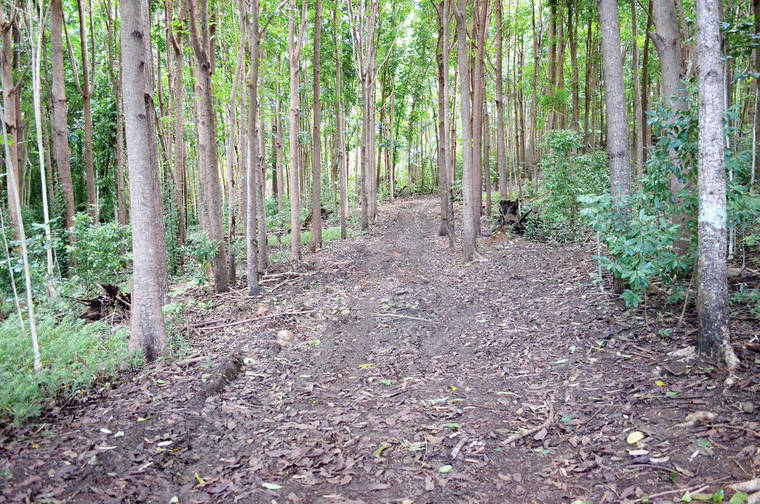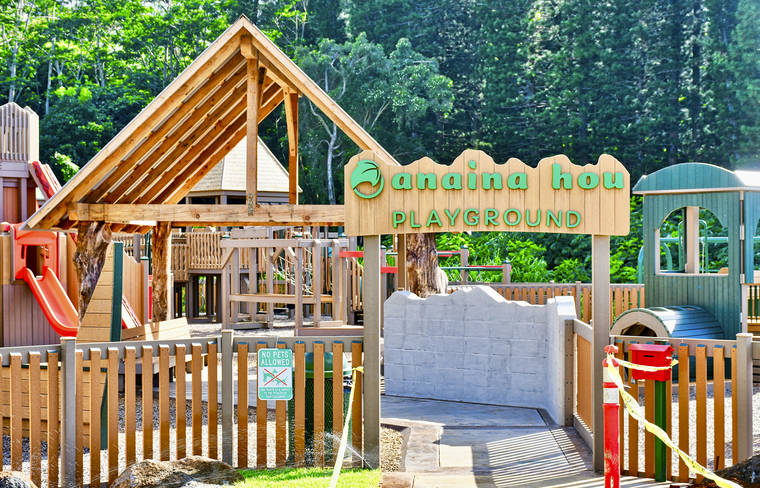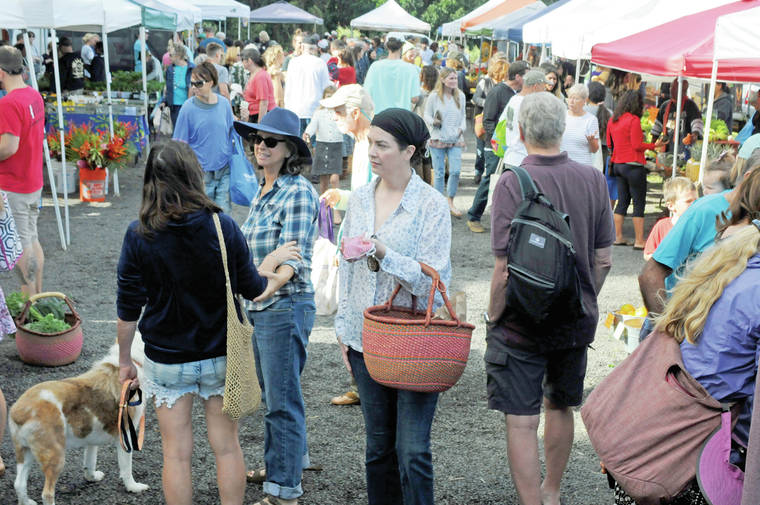Joan Porter, the co-founder of the Anaina Hou Community Park in Kilauea, has penned an open letter to the community warning that the multimillion-dollar philanthropy from her and her late husband, Bill Porter, which built the park in 2009 and has kept it open ever since, is coming to an end. She asks the community to respond financially to ensure the facility will survive.
Porter — who now lives in California — sent the letter just as Anaina Hou was putting on a Social Awareness Film Festival, the park’s first foray into the film-festival market. Anaina Hou has recently appointed a new executive director, Jill Lowry, and recruited several new board members with the hope of creating more robust fundraising.
Bill Porter, who founded E-trade, died in 2015 at age 87. He and Joan purchased the Anaina Hou property and several hundred surrounding acres they called the Wai Koa Plantation in 2004. They started Anaina Hou in about 2009, and the organization was incorporated as a nonprofit in 2012.
Over the next several years, Porter said, she and Bill invested about $13 million in Anaina Hou.
Last year, Joan Porter put 520 acres of the plantation up for sale, the proceeds of which she intends to leave to her grandchildren. That leaves Anaina Hou, which occupies about 19 acres, to fend for itself.
Lowry said that in addition to addressing its financial challenges, Anaina Hou plans to develop more of its available land for use by community groups. The weekly farmers’ market, a Kilauea mainstay, will probably be relocated from the
plateau on which it now occurs to elsewhere on the property.
Anaina Hou could also house a community resilience center, where the police and fire departments could stage their responses to future natural disasters, Lowry said. It is all part of a shift in Anaina Hou’s operating philosophy to provide community activities more diverse than its existing mix of a miniature golf course, a playground, a cafe and the Porter Pavilion, an event and concert space.
One of Lowry’s visions, she said, is construction of “a large, monolithic dome” that could serve as a hardened shelter in the event of a disaster. At the moment, the only structure designed to protect occupants in a major hurricane is a small room at the Kilauea Neighborhood Center, which has a capacity of about 70 people.
She said she envisions a large solar carport that could generate enough electricity to meet the day-to-day needs of Anaina Hou’s existing facilities, except for the Porter Pavilion.
“We felt we have a community responsibility to be more than entertainment,” Lowry said. Lowry said Anaina Hou has enough financial resources — if the money is carefully managed — to last for another five years. But if community support does not materialize, she said, Anaina Hou’s future could come into doubt.
That the Porter largesse might have an end point has been known in the community for some time. The final installment of about $4.25 million came in 2017 with proceeds from the sale of the Stillpath Retreat Center in Woodside, California, which Joan founded. Stillpath had been in business as a retreat center since 2009, but closed in about 2014 when it was set to be converted into an inpatient drug treatment center.
But a community protest in Woodside led the San Mateo County Board of Supervisors to deny the facility’s petition to focus on drug treatment. The terms of the gift that came from sale of the Woodside property commit half of the money to operations of Anaina Hou and the remaining funds to support a proposed new public charter school serving the middle and high school grades on the property.
The project, Namahana Charter Schools, is in the process of getting organized and applying to the Hawai‘i State Charter School Commission for an operating permit. It is currently fundraising through the Kaua‘i North Shore Community Foundation. The Porters awarded a 99-year license for eight acres at Anaina Hou for development as a school when another school Bill Porter was supporting was unable to continue operating. The land lease was transferred to Namahana.
In her open letter, Joan Porter addressed concerns that have become widespread in the community. She identified the donation of Anaina Hou’s skateboard ramp to the Anahola Marketplace as one source of concerns, which include “increasing rental fees for facility spaces” and the “reduction in free activities.” Lowry said ridding itself of the skateboard ramp saved Anaina Hou about $30,000 a year in insurance costs.
Joan Porter continued: “I also understand that there are sentiments that Anaina Hou was better when Bill and I were involved or I stopped providing financial support because of something that Anaina Hou leadership has done to terminate this support.” She said she and her late husband had always planned to confine their giving to building the facility and underwriting its operations for a few years, but that no permanent endowment was established and the plan was always for the park to be self-supporting.
“Today, Anaina Hou’s trials are financial in nature and finding a path to sustainability. Money does make things easier and Bill and I were blessed to have this resource,” she said. “We always knew that transitioning from our financial support, when the time came, would be a difficult, challenging and nerve-racking time.”
Lowry said Anaina Hou has been adapting to its new financial reality for several months, in which fees charged for event space use, for example, have been increased. Some services at the park were previously provided without cost.
“Things are evolving,” Lowry said. “This is our first year without the Porter financial support. Many people, to this day, think the Porter funding is still here.”
Lowry said Anaina Hou’s costs included everything from landscape maintenance to insurance and utilities. The park has 10 to 12 employees, she said. Ironically, she said, until more events can be scheduled at the Porter Pavilion, profits from the bar concessions at existing concerts, weddings and other events are keeping Anaina Hou’s head above water.
Because the bar revenue remains important to Anaina Hou’s operating budget, she said the park has been forced to institute a policy that sets 21 as the minimum age for attendance at many Porter Pavilion events. “We didn’t used to even do bag checks” for events where alcoholic beverages are served, she said. “It’s about safety.”
“This type of place needs philanthropy,” Lowry said. She said she and her directors have reconstructed the composition of the board. She said Bill Porter had “not accounted for the need for fundraising.” New board members, she said, are from entities as diverse as a condominium development in Princeville, the Rotary Club of Hanalei Bay, Gather Federal Credit Union and the Bank of Hawai‘i.
“I’m very grateful that everyone (on the board) bought into the mission,” she said. She said that, to sustain operations at their current level, Anaina Hou will have to raise about $2.5 million a year if it is to remain viable after the last Porter funding has been depleted.
“If you want us to be here, you’re going to have to support us,” she said. “We’re not going to be able to keep our heads above water just with events.” She said Anaina Hou had nine paying events in 2019, but that the break-even point for the park will require 20 a year moving into the future.
•••
Allan Parachini is a Kilauea resident, furniture-maker, journalist and retired public relations executive who writes periodically for The Garden Island.








Hawaii is at the bottom of the list of places to conduct business in the U.S,….and this is an example; hard to survive with high taxes, tough employment laws, regulations and surrounded by water;
sounds like they need more support from off island ventures/capital….
the Porters have done so much for the island;
very sad situation and hope they can make it;
No one really cares if you are around Anina Hou, The new director does not understand what Aloha means. Aloha
Someone in the community needs to step up and get more good bands to come here.
Wait! I thought it was free!! You mean other people paid for it? Like government spending and healthcare?
Sell it to the highest bidder, or let it go back to nature. It’s a red herring.
While the Porter’s hearts were in a good place, this has always been one of the worst ideas for the only industrial zoned land that is desperately needed on the north shore as a functioning community.